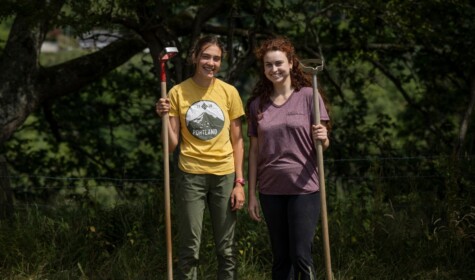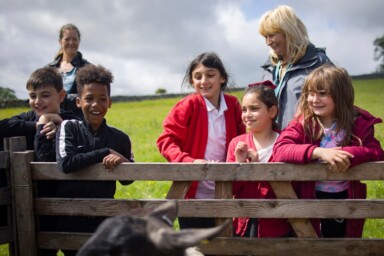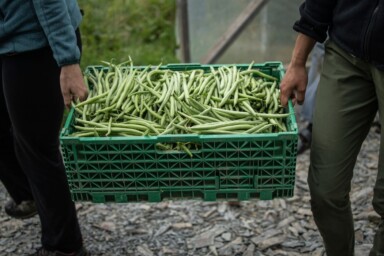Kicking off our latest series of articles exploring the transformative power of on-farm education, the SFT’s Head of Projects, Bonnie Welch, examines how farm visits can help to reconnect young people with nature and the story behind their food.
Today, many of us spend most of our time indoors, often in front of a screen and disconnected from the natural world. And yet we know, intuitively, that spending time outdoors and in nature helps us to feel well.
If intuition isn’t enough, there’s also a growing body of evidence demonstrating the positive link between exposure to natural environments and positive mental and physical health outcomes. For instance, spending time in a woodland or garden, or having the opportunity to grow food, can improve mental wellbeing and reduce stress, anxiety and depression.
For young people today, connection with nature is particularly important, as according to research, in many countries young people are more likely to struggle with their mental health than previous generations. With children and young adults spending much of their time at school or college, taking learning out of the classroom offers an opportunity to increase exposure to and engagement with the natural world.
Nature-based learning, such as on school grounds and field trips, has been shown not only to improve social and psychological outcomes, but also educational attainment, attendance and motivation. According to WWF’s Schools for Nature report, “pupils who learn through and in nature, have an advantage over their peers whose learning is solely classroom based”. However, the research, involving 1,885 schools from across the UK, revealed that over a third of primary schools and half of secondary schools offer no outdoor learning opportunities at all. The report also points to what some are calling a “nature gap”, referring to the disparity in who participates in outdoor learning, with young people from low-income families and ethnic minorities less likely to have such opportunities.
In an attempt to tackle this issue, the Nature Premium Campaign, a specialist group led by the Institute for Outdoor Learning, are calling for Government to fund regular and ongoing nature experiences for all children and young people, with additional funding and support for those who need it most.
Alongside this, the Government’s National Educational Nature Park, launched in 2023 by the Department for Education, the Natural History Museum, the Royal Horticultural Society and partners, aims to offer children and young people the opportunity to take hands-on action to improve biodiversity and tackle climate change. The offer to educators includes access to resources, digital tools and activities, as well as a virtual nature park signposting green spaces across England. The ambition is to encourage more young people to take action to improve their local environment for people and nature.
Putting sustainability and nature at the heart of teaching and learning is the core mission of the educational charity, The Harmony Project, led by former primary school headteacher Richard Dunne. The Harmony Project offers an approach to education that promotes learning from nature, in addition to learning about nature and in nature. This is what they call the ‘Natural Curriculum’, which enables young people to develop a more connected, systemic way of seeing and understanding the world and their place in it.
What role can farms play?
The farming systems that produce our food have a considerable, and often damaging impact on the environment. However, they also have the potential to help restore biodiversity, regenerate local ecosystems and rebuild soil carbon. The food choices we make are therefore of great importance.
Increasing nature connectedness (the relationship between people and the rest of nature) has shown to also improve pro nature behaviour in young people. And so, reconnecting young people with the story behind their food, could serve as a critical tool in encouraging them to act in a way that protects and enhances nature, for instance, by opting for certain foods over others, or by taking an active interest in sustainable food and farming – perhaps considering it as a career.
During a recent Sustainable Food Trust (SFT) podcast, Alice Pawsey, an organic farmer from Suffolk and a member of the SFT’s newly launched Beacon Farms Network (which brings together sustainable and regenerative farms acting as educational platforms), spoke of why farms are the perfect stage for learning.
“The possibilities for farm visits are boundless. They are exciting, they are engaging, and they reinforce just about every single element of the curriculum – from English to music, to PSHE, to science and biology.
The rewards are unbelievable for children, particularly for those children that don’t do very well in school. They seem always to thrive on a school visit! I had a child who jumped in the ice and thought it was glass. They’d never experienced jumping in a puddle…and continued to jump in every puddle they could find for the whole day.
It’s a no-brainer for Government to support school visits [to farms]. The farms are there, and the schools are there. There’s an untapped educational resource just waiting to be joined up.”
As part of the Beacon Farms Network, the SFT has been working closely with The Harmony Project to develop templates and resources to support school visits to farms. Each of the resources will be linked to key subject areas such as science, geography, history and design technology (DT). The National Curriculum in England already requires DT teachers to look at how food has been grown, reared, caught or processed. Richard Dunne believes this presents an opportunity to bring nature into the classroom and indeed to take the learning beyond the classroom.
“One of our goals is to help teachers and educators learn more about the food and farming systems that produce our food. In design technology, the focus on cookery and nutrition is mainly around developing culinary skills. Whilst this is important, we are encouraging teachers to explore cookery and nutrition as a three-step process.
Firstly, to research the story of where our food comes from, including its provenance, the farming system that grew or produced it, and the impact of that system on climate, nature and health.
Secondly, to develop the practical skills of cooking, so that young people know how to cook healthy meals from scratch.
And thirdly, to consider who they will share their food with, as the essence of a good meal is that it is shared with family, friends or others in the community.
Throughout this journey of learning, there are also opportunities to link learning to real life examples of where food comes from, for example, through food growing projects in school and farm visits. This more holistic approach provides children with a much greater understanding of the story of their food, not just how to cook and eat what they buy.”
Whilst farm visits provide an excellent opportunity for young people to build greater connections with nature whilst learning about the systems that produce our food, at present, school trips in the UK are often irregular and optional. It is therefore essential that the Government works together with charities, organisations and businesses to increase the availability and diversity of outdoor learning opportunities, so that they are available to all young people, regardless of geography or socio-economic background.
Organisations like Farms for City Children, LEAF Education and The Country Trust, as well as the Beacon Farms Network, are among those already working with schools to offer experiential learning opportunities for young people on farms across the UK. Providing more memorable and meaningful nature experiences will, with any luck, improve educational outcomes, as well as being good for mental and physical health, and for nature.
We recently launched the Beacon Farms Network, which brings together sustainable and regenerative farms acting as educational platforms to inspire young people and adults about the story behind their food. Find out more about the Network here.
Featured image taken by Jason Taylor.







